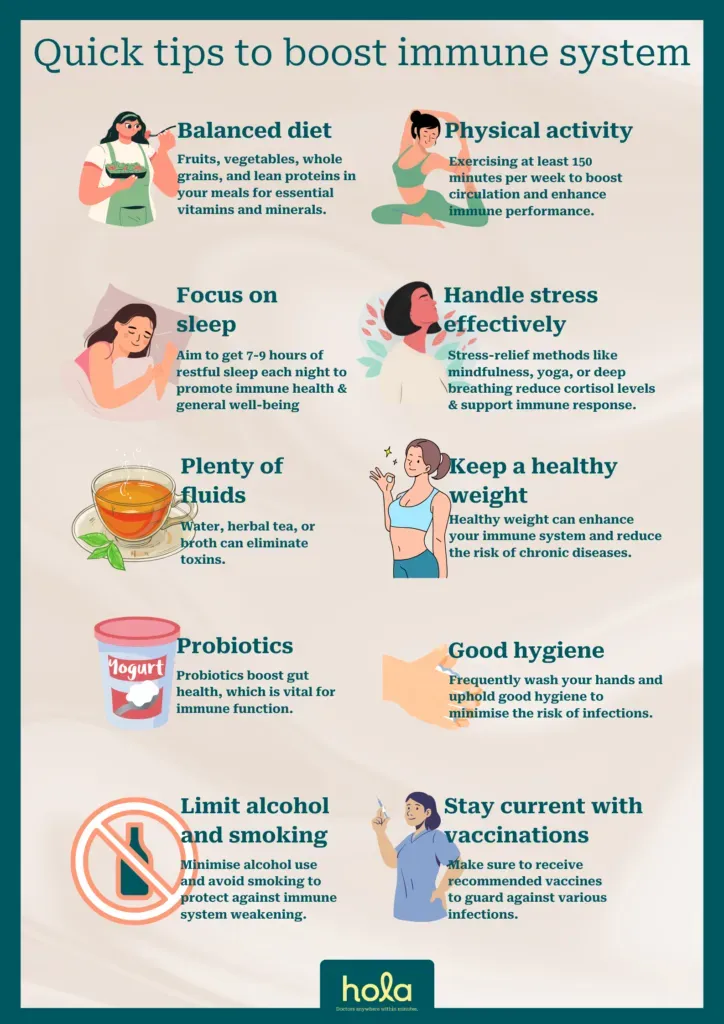How to tell if your immune system is weak?
Written by the editorial staff writer at Hola. Medically Reviewed by Dr Gosagan Gopalakrishnan, BSc (Hons), MBChB, DRCOG, MRCGP, FRACGP. and Dr. Ammar AL-ANI, MBChB, CCBST, AMC. Blog updated on 12 November, 2025. Originally published on 14 December, 2024.

Contents

Overview
Your immune system acts as your body’s defence squad, constantly working to protect you from bacteria, viruses, and other invaders. But if that squad starts to weaken, your body may struggle to bounce back from infections. Understanding the signs of a low immune system and knowing when to get tested is key to staying strong and healthy. In Australia, most of us overlook our health until something goes wrong. But stress, lack of sleep, and chronic conditions can all weaken immunity. This blog will help you recognise early warning signs, understand the available tests, and know when it’s time to consult your online GP.Importance of Immune Health
When your immune system is doing its job, you barely notice it—it silently protects you from everyday threats. But once it slows down, you may experience more frequent infections, feel constantly tired, and take longer to recover. By checking immune health:- You can identify problems early, before they lead to serious complications
- You’re able to spot underlying factors (such as diet or chronic illness) and take steps to manage them early.
- You can receive focused care, such as consulting an immunologist or trying targeted therapies rather than relying on guess work.
Common Causes
Several factors can reduce your immune system’s ability to fight infections effectively. Some key contributors include:- Poor nutrition
- Lack of sleep
- Chronic stress
- Excessive alcohol or smoking
- Sedentary lifestyle
- Chronic medical conditions like diabetes or autoimmune disorders
- Long-term medication use (like steroids)
Symptoms
If your immune system is under strain, your body often sends warning signs. Watch for these common indicators:- Recurrent infections: Experiencing frequent infections, like colds, flu, or other illnesses, can be a strong sign of a weakened immune system.
- Delayed healing: Injuries, cuts, or infections that take longer to heal than normal could signify a diminished immune response.
- Chronic exhaustion: Ongoing fatigue or tiredness that doesn’t improve despite adequate rest might point to suboptimal immune system function.
- Digestive problems: Regular gastrointestinal issues, like diarrhoea, constipation, or bloating, may indicate an imbalance in gut health, closely linked to immune performance.
- Worsening allergies or autoimmune conditions: An increase in allergic reactions or the emergence of autoimmune disease symptoms can suggest that the immune system is either overreacting or malfunctioning.
- Skin issues: Skin issues like rashes, persistent acne, or other irritations may indicate difficulties with the immune system.
- Frequent fever or inflammation: Chronic fevers or signs of inflammation may indicate that the body is consistently working to fight off infections or deal with inflammation.
Testing Your Immune Health
Doctors use several tests to assess how well your immune system is functioning. Common ones include:Blood-based tests:
- Full Blood Count (FBC): This assessment measures white blood cells, red blood cells, and platelets. Abnormal white blood cell levels may signal problems with the immune system.
- CRP (C-reactive protein) and ESR (Erythrocyte Sedimentation Rate): Markers of inflammation—higher levels may suggest persistent immune activation or an underlying infection.
- Fasting glucose or HbA1c: These tests can indicate you are suffering from impaired sugar control or diabetes, which may affect your immunity and ability to fight off infections.
Allergy and autoimmune tests:
- Skin test: Shows whether your immune system is responding to specific allergens.
- Antibody test: To check whether the immune system is attacking your own tissues.
Feeling unwell? Consult an Australian-registered GP online, 24/7.
Prevention tips
 While no single food or supplement can ‘supercharge’ immunity overnight, consistent healthy habits can make a big difference. Here are strategies you can adopt:
While no single food or supplement can ‘supercharge’ immunity overnight, consistent healthy habits can make a big difference. Here are strategies you can adopt:
Nutrition and hydration:
- Eat a balanced diet rich in fruits, vegetables, lean proteins, whole grains, nuts, and seeds.
- Include probiotics (e.g., yogurt, fermented foods) in your diet to boost gut immunity.
- Stay well hydrated to support your body's functions and eliminate toxins.
Lifestyle habits:
- Prioritise 7-9 hours of restful sleep each night to promote immune health and general well-being.
- Engage in regular moderate physical activity for at least 150 minutes per week to boost circulation and enhance immune performance.
- Manage stress through mindfulness, deep breathing exercises, yoga, or spending time in nature.
- Maintain a healthy weight and manage chronic conditions like hypertension or diabetes.
Preventive measures:
- Stay up-to-date with vaccinations—COVID-19, influenza, etc. Ensure to receive recommended vaccines to guard against various infections.
- Maintain good hygiene practices. Frequently wash your hands and avoid contact with sick people to minimise the risk of infections.
- Avoid alcohol and smoking.
When to consult doctor?
If you notice persistent or troubling signs, it’s wise to consult a GP. Watch for:- Frequent infections (like colds or sinusitis)
- Persistent fatigue despite rest
- Slow wound healing or repeated skin infections
- Unexplained weight loss
- New or worsening allergies
- Family history of immune disorders
- Blood Test Referrals: Get essential immune function and inflammation markers tested.
- Specialist Referrals: Connect with immunologists or specialists if required.
- Bulk-Billed GP Telehealth: Speak to an online doctor for personalised advice and diagnosis.
- Online Prescriptions: Receive bulk-billed scripts for medications or supplements to support immune function.
- Medical Certificates: Secure a doctor’s certificate for rest or recovery when needed.
Conclusion
In summary, keeping your immune system strong is like giving your body a superhero transformation! By observing the cues of a depleted immune system and implementing proactive strategies—like proper nutrition, sufficient rest, and stress reduction—you can boost your body’s defences against undesirable threats. So, get ready, embrace your health, and awaken your inner health warrior! A strong immune system gives you more energy for adventures and less time stressing over sickness. Let’s make health your superpower!FAQs
Can stress really weaken your immune system?
Yes, chronic stress triggers frequent release of cortisol and other stress hormones, which gradually weaken your immune system and lower your resistance to infections.What blood test shows an immune deficiency?
There’s no single test. However, common ones include full blood count, CRP (C-reactive protein), ESR (Erythrocyte Sedimentation Rate), and specific antibody response tests after vaccination.How long does it take to boost immunity naturally?
It depends on how weakened your immune system is and how consistently you implement changes. But with a good diet, sleep, exercise, and stress and health management, you may begin to see improvements in weeks to a few months.Need to see a specialist? Request your specialist referral with Hola Health.
Providing consult for
- Cough
- Nausea & vomiting
- Fever
- Hayfever
- Fatigue
- Sore throat
- Acne
- Gout
- Eczema
- Rosacea
- Sunburn
- UTI
- Erectile dysfunction
- Contraception
- Morning sickness
- Morning after pill
- Prostate health
- Anxiety
- Depression
- Stress
- Grief & loss
- Premature ejaculation
- Asthma
- Blood pressure
- Diabetes
- Cholesterol
- Migraines & headaches
- Allergies
- Heartburn & reflux
- Sleep disorder
- Gastro
Related Articles
Disclaimer
This blog is for general informational purposes only and does not indicate that Hola Health provides all treatments or preventive measures mentioned. It is not intended to be a substitute for professional medical advice. Always seek the guidance of your doctor or other qualified health professional with any questions you may have regarding your health or a medical condition. For emergencies please immediately contact 000. Any medical topics discussed are intended to educate, not to imply availability through Hola Health.




